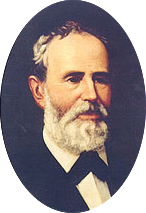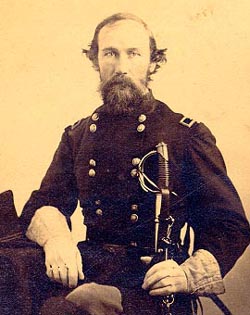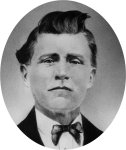GENTLEMEN OF THE CONVENTION:
I extend to you a cordial welcome to the Capitol, and assure you that the officers of the Provisional Government are anxious to afford you every facility for the discharge of the great duty for which you have been elected—of establishing a constitution and a civil government for Texas, loyal to the Union.
The situation of the Provisional Government has been, and must continue to be, one of extreme difficulty and embarrassment. This was foreseen by me when I accepted my present position; but I could not decline it without seeming to be unwilling to aid in giving effect to what are known as the reconstruction laws. I knew that my appointment was distasteful to a large majority of the people of Texas who had participated in the rebellion, and who had heretofore exercised the political power of the State. But the emancipation and enfranchisement of our colored population had infused a new element into the body politic, who are hereafter to exercise political rights; and I believed that this class, with the loyal whites, would, as the result has shown, constitute a majority of the voting population, and to whom, I had reason to believe, my appointment would not be unacceptable.
The powers vested in the officers of the Provisional Government are exercised in subordination to the Commander of the Fifth Military District; and without his co-operation and assistance, all their efforts to execute the laws and preserve the public peace can avail but little. I regret to say that, in some instances, this co-operation and assistance have been withheld, and the acts of the provisional officers have been misrepresented and their recommendations disregarded. A knowledge of these facts has so emboldened and encouraged those who are disposed to disregard the laws that, in many instances, sheriffs have reported to this office that they were unable to obtain the aid of citizens to make arrests, because they feared personal violence from the parties and their friends.
It is due to the present Commander of the Fifth Military District that I should say, in this connection, that he has manifested a disposition to enforce the laws, and I am hopeful of improvement in this regard under his administration.
It affords me pleasure to state that the officers who have been in command of the District of Texas have at all times cordially sustained my recommendations, and rendered every assistance in their power in the execution of the laws; but their powers have been very limited.
It is not the part of wisdom to disguise from ourselves the true situation of affairs. Crime was never as prevalent in Texas as it is at this time. Since the first of December last, authentic information has been received at this office of two hundred and six (206) homicides, committed in only sixty-seven (67) of the one hundred and twenty-seven organized counties of the State, while but a small number of the perpetrators have been arrested and punished by the process of the law. This state of things has become so alarming that the people, in several instances, have taken the law into their own hands, and have executed the murderers without a trial—a proceeding which is always dangerous and greatly to be reprobated.
Any great improvement in the prevention and punishment of crime must be the work of the people themselves. So long as they tolerate the present violence and disorder and the failure to arrest and punish disorders, affairs will continue to grow worse, and be a reproach to the State. But when they will it, the municipal officers of the State will become efficient and vigilant in the discharge of their duties, life and property and personal rights will be protected, and all our material interests will prosper. The first step toward the attainment of these desirable results is the re-establishment of civil government, and the resumption of our relations with our sister States as a member of the Union.
This can now be accomplished, if our citizens choose to comply with the conditions prescribed by the laws of the United States, under which your honorable body has been elected. Few persons supposed, when hostilities had ceased by the surrender of the Confederate armies, that three years would elapse before the rebel States would be fully restored to the Union. Yet three years have elapsed; and, from the temper manifested by the public press of the State, we are apparently no nearer the accomplishment of that object than we were in May, 1865. The great majority of the white population of our State seem to have profited very little from their past experience on this subject. They still reject with scorn the mild terms offered them by the United States. While they complain that any portion of their number should be disfranchised for participation in the rebellion, they insist that loyal citizens shall not be enfranchised, because said loyal citizens are of a different race and color, although subjected to all the burdens that are imposed upon other citizens for the support and defense of the government.
The laws referred to disfranchise only such a portion of our citizens as the government of the United States considered necessary to enable the residue to establish governments loyal to the Union and in harmony with its present policy. No one supposes that this disfranchisement will be extended any further than is necessary to accomplish that object; while provision will doubtless be made for the removal of political disabilities as rapidly as the safety of the government will permit. Many of those who now oppose the enfranchisement of the colored race would gladly accept the terms proposed by President Johnson in 1865, and the proposed amendment to the Constitution of the United States, known as the Fourteenth Article, which were so contemptuously rejected. And it is worthy of their serious consideration, whether they will not bring upon themselves what they will deem much harder terms, if by their continued opposition they shall succeed in defeating the present effort to reconstruct the State.
It is not my province to make recommendations for your action; but I trust that it will not be considered improper for me to suggest that, in the constitution you are about to form, it is expected—
That you will declare that the pretended act of secession and all laws that have been enacted in aid of the late rebellion, or repugnant to the Constitution and laws of the United States, are and were null and void from their inception; and that you will at once repeal all laws that make any discrimination against persons on account of their color, race or previous condition;
That you will provide for ascertaining and paying all debts that were owing by the State at the commencement of the rebellion, and prohibit the payment of any debts incurred in aid of the rebellion, or for the support of the rebel government, during its progress;
That you will secure equal civil and political rights to every inhabitant of the State who has not forfeited these rights by participation in the late rebellion, or by conviction for crime;
That you will temporarily disfranchise a number of those who participated in the rebellion, sufficient to place the political power of the State in the hands of those who are loyal to the United States Government;
That you will make a liberal provision, by taxation upon property, for the immediate establishment of Free Public Schools for the education of every child in the State;
That you will secure to every citizen of the State, who has not heretofore received it, a reasonable amount of land out of the public domain for a homestead;
That you will adopt efficient measures to encourage immigrations to our State from foreign countries, and to give aid and encouragement to such works of internal improvement as the necessities of our people require.
All these measures are called for by the public sentiment of our loyal citizens, and are necessary, I think, to secure the future happiness and prosperity of all.
The division of Texas into two or more States is a question that has recently excited much discussion, and will doubtless be brought before your honorable body. I do not think that the public interests would be advanced by the adoption of such a measure at the present time. Our population does not probably exceed eight hundred thousand; and to subject them to the expenses of two or three
State governments, in their present impoverished condition, would not only be a very great burden, but would greatly diminish their ability to support a proper system of public education, and to give aid and encouragement to the measures that are needed to develop the wealth and resources of the State. If this measure is insisted on, it must inevitably delay our return to the Union; for the acts of Congress, under which the effort to reconstruct Texas is now being made, provide for the establishment of only one State within our territory. Should such a division hereafter be desired by our people, it can be more readily inaugurated and carried out after we shall have been restored to the Union, than it can be while we are without a representative in Congress.
There is another measure to which I would respectfully invite your attention; and that is, the propriety of authorizing a negotiation to be opened with the United States Government for a sale of all that portion of our territory lying west of a line drawn from the mouth of the Pecos river to the northwest corner of Hardeman county. This would include no part of the State that has been laid off into counties, except El Paso and Presidio counties, which are so far separated from the other parts of the State by a large uninhabited tract, that they cannot be properly accommodated with courts without making them a separate judicial district, at an expense greatly disproportioned to the revenue derived from taxation on the whole of the territory proposed to be sold. It is believed that the inhabitants of those counties will be favorable to the measure. This territory adjoins the territories set apart by the United States for the Indians, and would be useful to them in carrying out their Indian policy. It would be far more valuable to them than it can ever be to this State; and they will doubtless pay us a price for it far greater than we can realize from it in any other way. If we retain it, we shall probably fritter it away as we have the rest of our public domain, without securing any substantial benefit from it; while, with the money we may obtain from such a disposition of it, we shall at once be in possession of a fund that will enable us to do something effective for education, internal improvement and immigration, without subjecting ourselves to onerous taxation. Such a sale will still leave us sufficient territory to form three large States, whenever our citizens shall desire a division of it.
The officers of the government at this place are prepared to furnish your honorable body with such reports as will give you full and accurate information in regard to the state of the treasury at the commencement of the rebellion, during its progress, and at the present time; the condition of the School fund and the University fund, and what amount of each was diverted to the support of the rebellion; the sales of Land Scrip that were made during the rebellion, and all other information to be found in the public records that may be useful to you in the discharge of your duties.
The amount of money in the State treasury on the thirty-first of May, 1868, applicable to the ordinary expenditures of the government, is two hundred and three thousand, seventy-nine dollars and sixty-nine cents ($203,079 69); of which two hundred and two thousand, eight hundred and eighty-four dollars and thirty-five cents ($202,884 35) are in United States currency, and one hundred and ninety-five dollars and thirty-four cents ($195 34) are in specie. This is exclusive of the amount standing to the credit of the School, University and other trust funds. It is believed that this money, with that which will be received from time to time under the present tax laws, will be sufficient to meet all the expenditures of the government, and pay the expenses of your honorable body, unless they should be greater than is anticipated, without the necessity of imposing an additional tax upon our citizens, as contemplated by the supplementary reconstruction law of the twenty-third of March, 1867. The Convention of 1866 was composed of the same number of members as the present, and continued in session fifty-five days; and the entire expenses of that body were sixty-nine thousand nine hundred and thirty-three dollars and fifty-nine cents ($69,933 59). And it is estimated that ninety thousand dollars ($90,000) will be sufficient to cover your expenditures. And I would respectfully suggest that the Convention at once pass an ordinance, as contemplated by the said act of Congress of the twenty-third of March, 1867,
prescribing the fees, salaries and compensation to be paid to all delegates, and other officers and agents that may be necessary to enable you to complete your labors, and appropriating the sum of one hundress thousand dollars ($100,000), or so much thereof as may be necessary, to pay the same; and that you also pass a resolution requesting the Commanding General of the Fifth Military District to approve your action in the premises. This course, I learn, on consultation with the Treasurer and Acting Comptroller, is desired by them for protection, and will be recommended to said commander by myself and the officer in command of the District of Texas.
We have reason to congratulate ourselves on prosperous seasons, and the prospect of abundant crops. The freed people are doing well, far better than their most ardent friends anticipated under all the circumstances by which they have been surrounded. The prejudice against them is gradually giving way to a better feeling. Many of those who prophesied ruin to the country from their emancipation are now compelled to admit that there is still some hope for the future; and when they shall have been secured in the enjoyment of the same civil and political rights as the white race, and the question finally set at rest, it will become a matter of surprise to many that they ever opposed the measure, in a country where the institutions are professedly based upon the principle that governments derive their just powers from the consent of the governed.
I trust, gentlemen, that a spirit of harmony will mark all your actions, and that you will be governed by a sincere desire to establish such a form of government as shall secure equal and exact justice to all. And I invoke upon your deliberations the blessings of that Almighty Power that has so often and so signally interposed in our behalf as a community in the hour of need.
Very respectfully,
Your obedient servant,
E.M. PEASE,
Governor of Texas.




